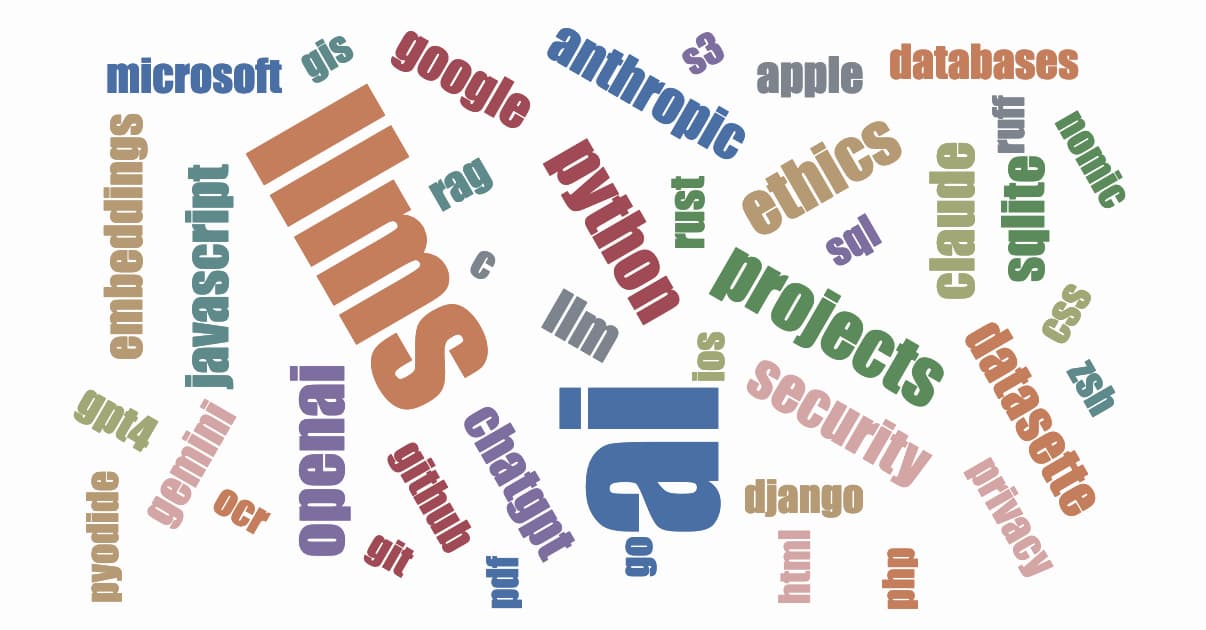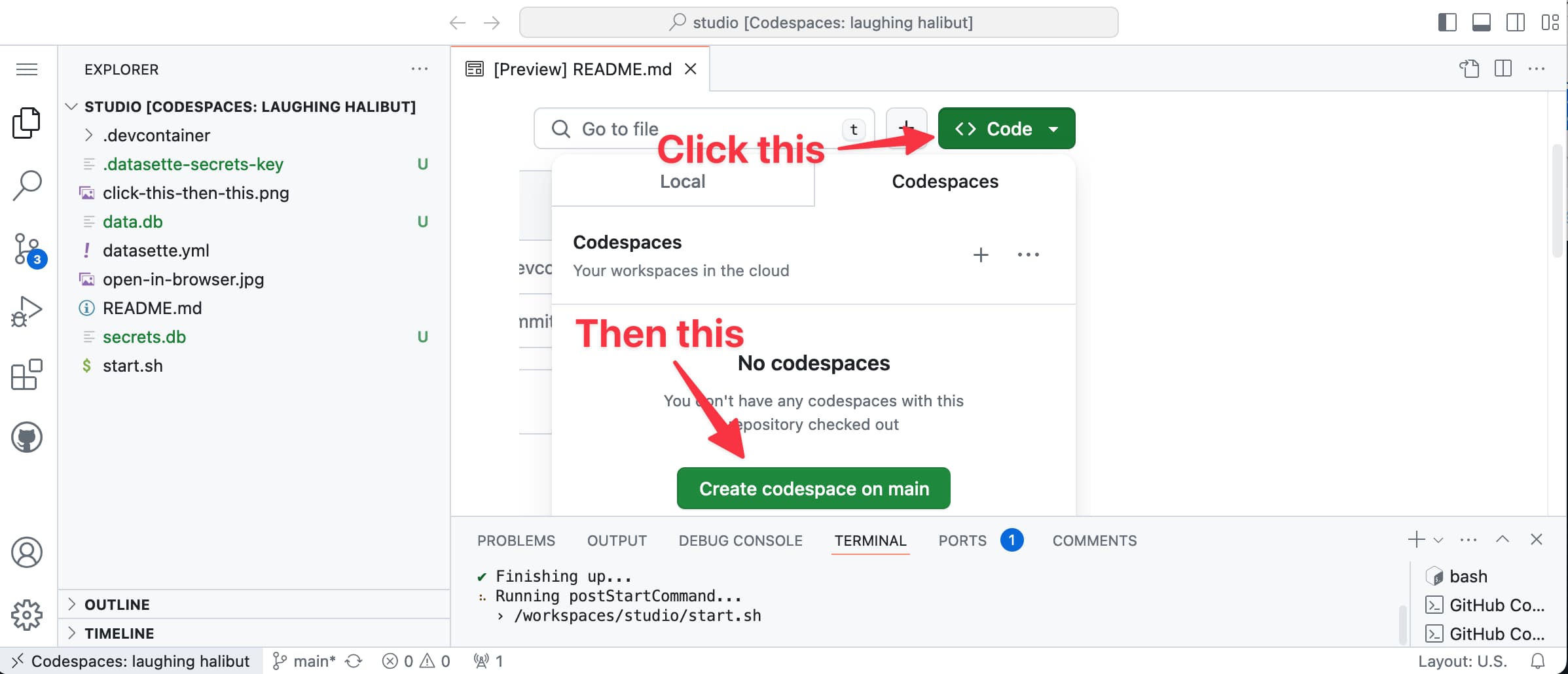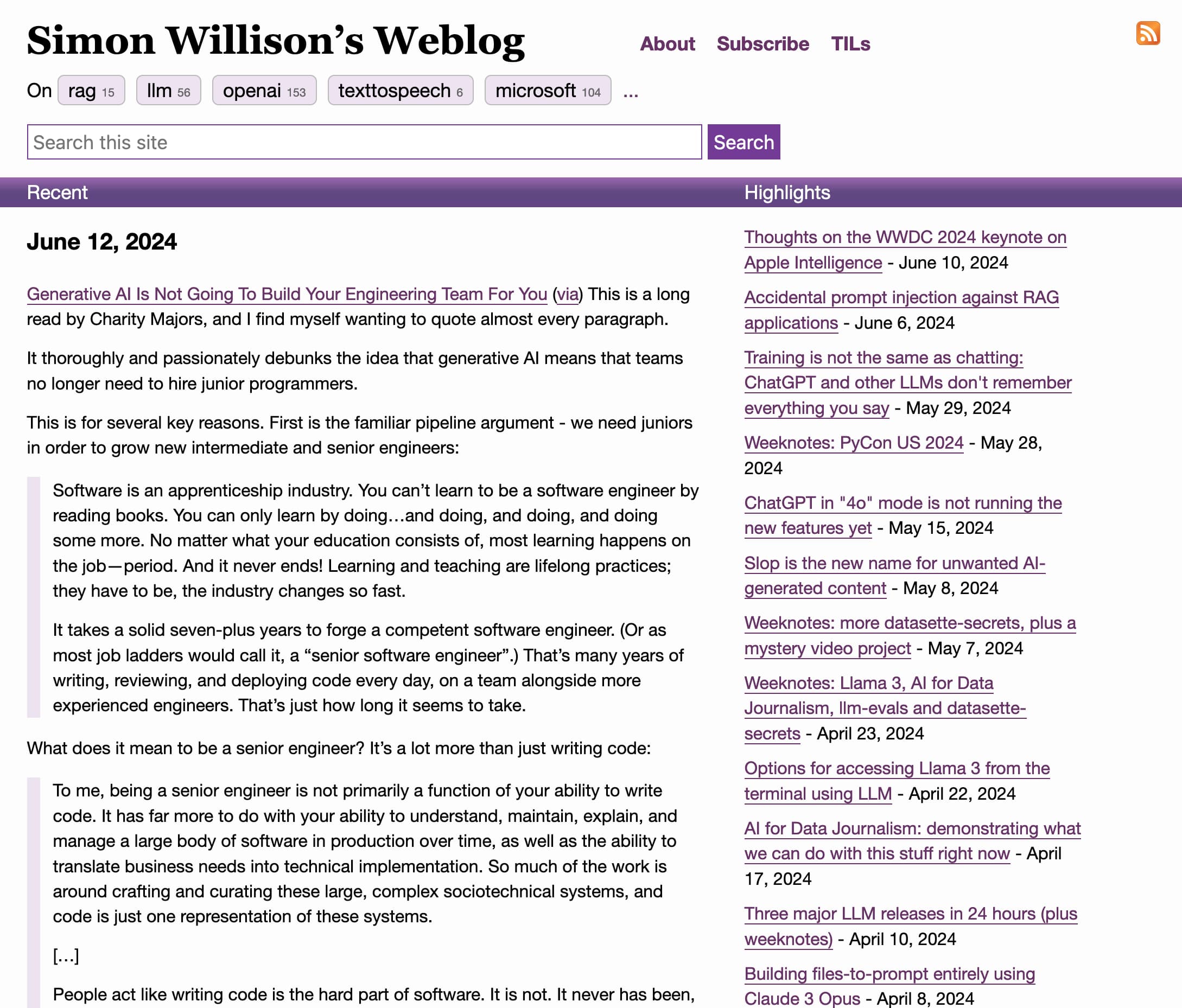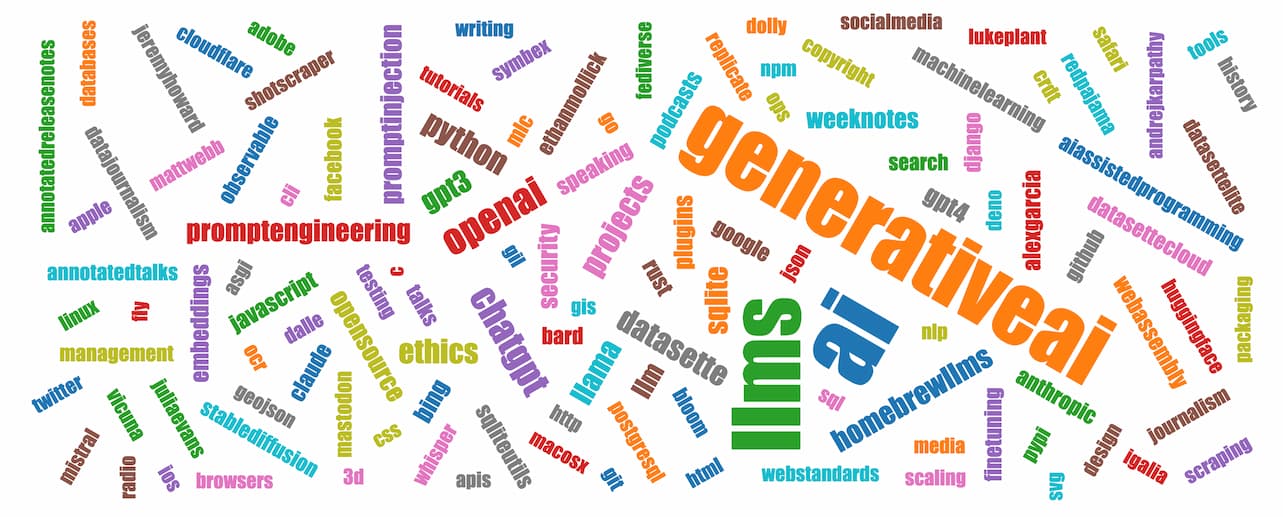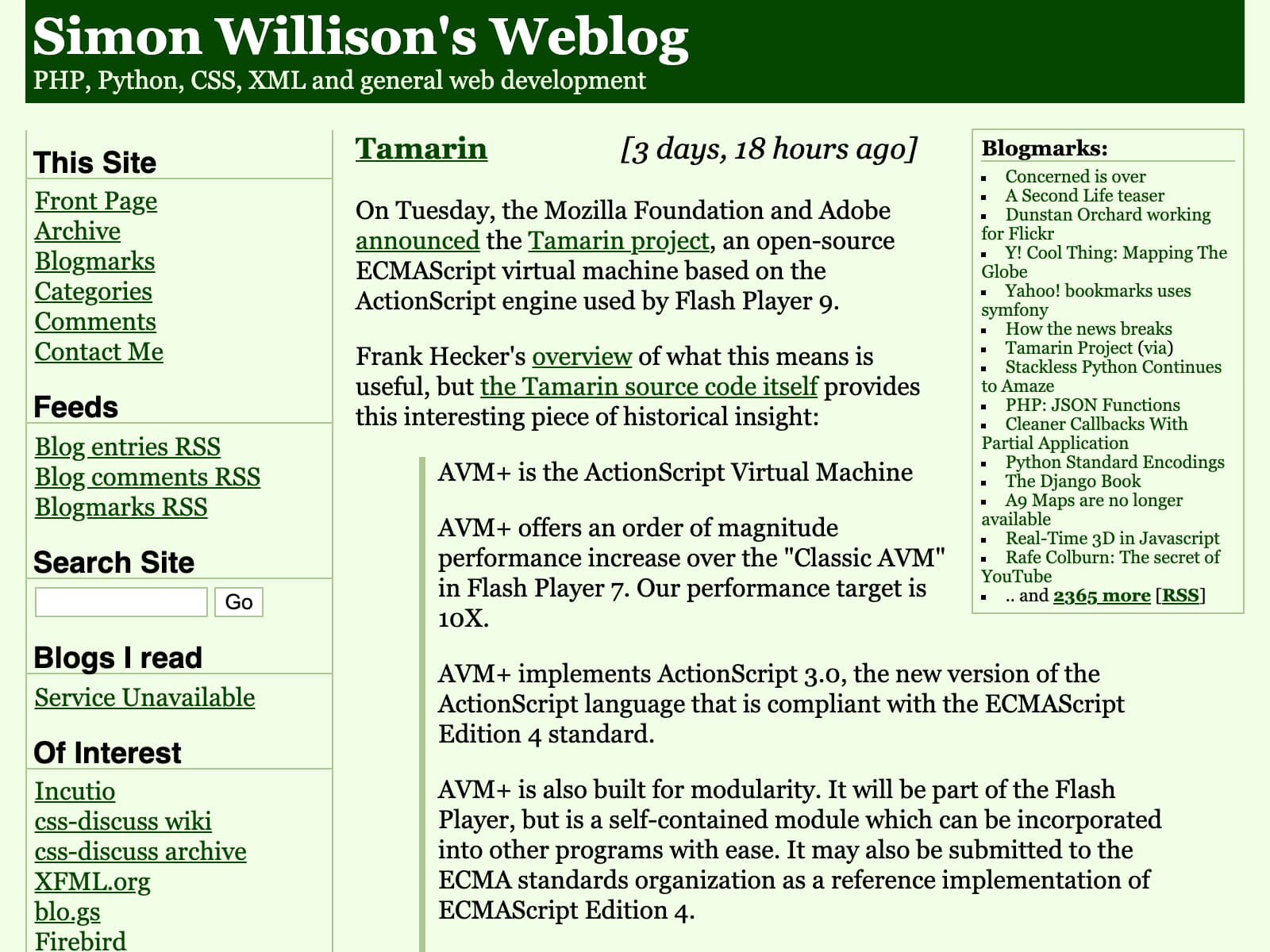115 posts tagged “blogging”
2024
Weeknotes: a livestream, a surprise keynote and progress on Datasette Cloud billing
My first YouTube livestream with Val Town, a keynote at the AI Engineer World’s Fair and some work integrating Stripe with Datasette Cloud. Plus a bunch of upgrades to my blog.
[... 1,124 words]New blog feature: Support for markdown in quotations. Another incremental improvement to my blog. I've been collecting quotations here since 2006 - I now render them using Markdown (previously they were just plain text). Here's one example. The full set of 920 (and counting) quotations can be explored using this search filter.
Microfeatures I Love in Blogs and Personal Websites (via) This post by Daniel Fedorin (and the accompanying Hacker News thread) is a nice reminder of one of the most fun things about building your own personal website: it gives you a low-risk place to experiment with details like footnotes, tables of contents, linkable headings, code blocks, RSS feeds, link previews and more.
Weeknotes: Datasette Studio and a whole lot of blogging
I’m still spinning back up after my trip back to the UK, so actual time spent building things has been less than I’d like. I presented an hour long workshop on command-line LLM usage, wrote five full blog entries (since my last weeknotes) and I’ve also been leaning more into short-form link blogging—a lot more prominent on this site now since my homepage redesign last week.
[... 736 words]Tags with descriptions. Tiny new feature on my blog: I can now add optional descriptions to my tag pages, for example on datasette and sqlite-utils and prompt-injection.
I built this feature on a live call this morning as an unplanned demonstration of GitHub's new Copilot Workspace feature, where you can run a prompt against a repository and have it plan, implement and file a pull request implementing a change to the code.
My prompt was:
Add a feature that lets me add a description to my tag pages, stored in the database table for tags and visible on the /tags/x/ page at the top
It wasn't as compelling a demo as I expected: Copilot Workspace currently has to stream an entire copy of each file it modifies, which can take a long time if your codebase includes several large files that need to be changed.
It did create a working implementation on its first try, though I had given it an extra tip not to forget the database migration. I ended up making a bunch of changes myself before I shipped it, listed in the pull request.
I've been using Copilot Workspace quite a bit recently as a code explanation tool - I'll prompt it to e.g. "add architecture documentation to the README" on a random repository not owned by me, then read its initial plan to see what it's figured out without going all the way through to the implementation and PR phases. Example in this tweet where I figured out the rough design of the Jina AI Reader API for this post.
A homepage redesign for my blog’s 22nd birthday
This blog is 22 years old today! I wrote up a whole bunch of higlights for the 20th birthday a couple of years ago. Today I’m celebrating with something a bit smaller: I finally redesigned the homepage.
[... 314 words]A Link Blog in the Year 2024 (via) Kellan Elliott-McCrea has started a new link blog:
Like many people I’ve been dealing with the collapses of the various systems I relied on for information over the previous decades. After 17 of using Twitter daily and 24 years of using Google daily neither really works anymore. And particular with the collapse of the social spaces many of us grew up with, I feel called back to earlier forms of the Internet, like blogs, and in particular, starting a link blog.
I've been leaning way more into link blogging over the last few months, especially now my own link blog supports markdown. This means I'm posting longer entries, somewhat inspired by Daring Fireball (my own favourite link blog to read).
Link blogging is a pleasantly low-pressure way of writing online. Found something interesting? Post a link to it, with a sentence or two about why it's worth checking out.
I'd love to see more people embrace this form of personal publishing.
How (some) good corporate engineering blogs are written (via) Dan Luu interviewed engineers from Cloudflare, Heap, and Segment—three companies with excellent technical blogs—and three other unnamed companies with blogs he categorized as lame.
His conclusion? The design of the process for publishing—most notable the speed and number of approvals needed to get something published—makes all the difference.
Save the Web by Being Nice. This is a neat little article by Andrew Stephens who calls for more people to participate in building and supporting nice things on the web.
The very best thing to keep the web partly alive is to maintain some content yourself - start a blog, join a forum and contribute to the conversation, even podcast if that is your thing. But that takes a lot of time and not everyone has the energy or the knowhow to create like this.
The second best thing to do is to show your support for pages you enjoy by being nice and making a slight effort.
Like, comment-on, share and encourage people who make things you like. If you have the time or energy, make your own things and put them online.
Blogmarks that use markdown. I needed to attach a correction to an older blogmark (my 20-year old name for short-form links with commentary on my blog) today - but the commentary field has always been text, not HTML, so I didn't have a way to add the necessary link.
This motivated me to finally add optional Markdown support for blogmarks to my blog's custom Django CMS. I then went through and added inline code markup to a bunch of different older posts, and built this Django SQL Dashboard to keep track of which posts I had updated.
2023
Stuff we figured out about AI in 2023
2023 was the breakthrough year for Large Language Models (LLMs). I think it’s OK to call these AI—they’re the latest and (currently) most interesting development in the academic field of Artificial Intelligence that dates back to the 1950s.
[... 2,974 words]Write about what you learn. It pushes you to understand topics better. (via) Addy Osmani clearly articulates why writing frequently is such a powerful tool for learning more effectively. This post doesn’t mention TILs but it perfectly encapsulates the value I get from publishing them.
Semi-automating a Substack newsletter with an Observable notebook
I recently started sending out a weekly-ish email newsletter consisting of content from my blog. I’ve mostly automated that, using an Observable Notebook to generate the HTML. Here’s how that system works.
[... 2,520 words]2022
2022 in projects and blogging
In lieu of my regular weeknotes (I took two weeks off for the holidays) here’s a look back at 2022, mainly in terms of projects and things I’ve written about.
What to blog about
You should start a blog. Having your own little corner of the internet is good for the soul!
[... 520 words]Twenty years of my blog
I started this blog on June 12th 2002—twenty years ago today! To celebrate two decades of blogging, I decided to pull together some highlights and dive down a self-indulgent nostalgia hole.
[... 4,455 words]2021
It doesn’t take much public creativity to stand out as a job candidate
I’ve spent nearly twenty years blogging, giving talks and releasing open source code. It’s been fantastic for my career, and a huge amount of work. But here’s a useful secret: you don’t have to put very much work at all into public creativity in order to stand out as a job candidate.
[... 495 words]One year of TILs
Just over a year ago I started tracking TILs, inspired by Josh Branchaud’s collection. I’ve since published 148 TILs across 43 different topics. It’s a great format!
[... 224 words]2020
15 rules for blogging, and my current streak (via) Matt Webb is on a 24 week streak of blogging multiple posts a week and shares his rules on how he’s doing this. These are really good rules. A rule of thumb that has helped me a lot is to fight back against the temptation to make a post as good as I can before I publish it— because that way lies a giant drafts folder and no actual published content. “Perfect is the enemy of shipped”.
Your own hosted blog, the easy, free, open way (even if you’re not a computer expert) (via) Jeremy Howard and the fast.ai team have released fast_template—a GitHub repository designed to be used as a template to create new repositories with a complete Jekyll blog configured for use with GitHub pages. GitHub’s official document recommends you install Ruby on your machine to do this, but Jeremy points out that with the right repository setup you can run a blog entirely by editing files through the GitHub web interface.
2018
How about if, instead of ditching Twitter for Mastodon, we all start blogging and subscribing to each other's Atom feeds again instead? The original distributed social network could still work pretty well if we actually start using it
— @simonw
One of the ways the internet has changed around us over the years is the blog-o-sphere of MetaFilter's early years has all but disappeared, and so has the kind of link-sharing culture that went with it.
2017
When you’ve written the same code 3 times, write a function. When you’ve given the same in-person advice 3 times, write a blog post.
Getting the blog back together
Getting this blog up and running again has turned out to be one of those side-projects that keeps threatening to fall down a rabbit hole.
[... 160 words]2013
If I write a blog, then use the same information to create a slideshare presentation, will that help or hurt my website’s SEO?
I would be absolutely amazed if you were hit by a duplicate content penalty for this. To a search engine spider (even a super advanced one) content formatted as a blog post and similar content repurposed as slides will look completely different.
[... 71 words]2011
What are the top five food blogger conferences to attend?
I can’t give you a top five, but you might find this list of 10 upcoming food blogger conferences useful: http://lanyrd.com/topics/food-bl...
[... 38 words]When was the 2011 Blog World Expo?
The dates haven’t been announced yet—they’ll be on http://www.blogworldexpo.com/ when they are, and there’s a mailing list you can sign up for.
[... 84 words]2010
Welcome to Lanyrd | The Lanyrd Blog. We’ve started a blog for Lanyrd, our social conference directory project. We’re off to a great start: “Lanyrd is now listing 1,508 conferences and 5,167 individual speaker profiles. 5,637 people have signed in to the site and made 13,293 edits to our data.”
If journalism is the first draft of history, live blogging is the first draft of journalism.
